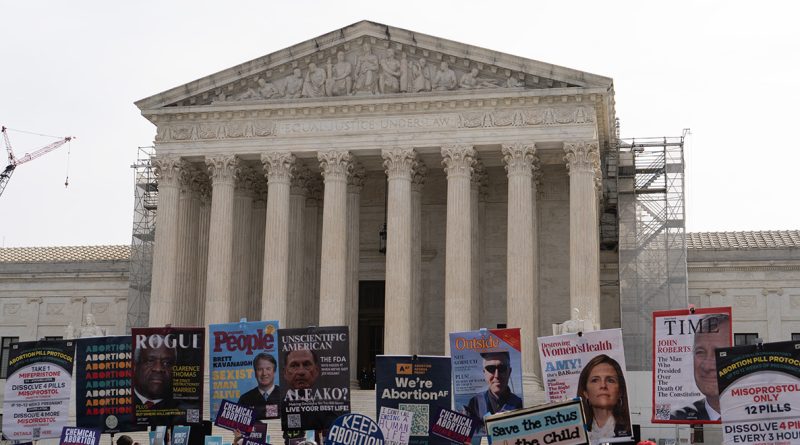Supreme Court appears skeptical of potential limitations on abortion pill mifepristone
By FATIMA YAZDI
Capital News Service
WASHINGTON – Most of the Supreme Court justices appeared skeptical Tuesday of oral arguments that they should rule in favor of restricting nationwide access to the abortion pill mifepristone.
The justices questioned whether the anti-abortion doctors with Alliance for Hippocratic Medicine, who filed the lawsuit against the Food and Drug Administration in November 2022, had been injured as a result of the FDA lifting restrictions on mifepristone usage in 2016 and again in 2021.
The mifepristone case is the most important abortion case before the court since the overturning of Roe v. Wade and the end to a constitutional right to an abortion with the Dobbs v. Jackson decision in June 2022.
If a 5th Circuit Court of Appeals ruling is allowed to stand, access to the widely used drug for abortions would be curtailed and could impact the presidential election.
Justices began questioning focused on who has standing to challenge the FDA’s actions in 2016 and 2021.
“Is there anybody who could challenge in court the lawfulness of what the FDA did here?” Justice Samuel Alito asked Justice Department Solicitor General Elizabeth Prelogar, who argued on behalf of the FDA.
The 2016 changes “increased the gestational age limit from seven to ten weeks,” reduced the number of required in-person medical visits and allowed non-physician healthcare providers, such as nurse practitioners, to prescribe and distribute mifepristone.
In 2021, due to the COVID-19 pandemic, the FDA utilized telehealth and eliminated the requirement for in-person distribution of the pill and later made the permanent change in 2023.
“The government has been routinely resisting standing because we think that that would essentially mean that any advocacy organization could say it opposes what the federal government is doing and so therefore has to devote resources to that opposition,” Prelogar said.
Numerous back-and-forth exchanges between the justices and Erin Hawley, wife of Sen. Josh Hawley, R-Missouri, who argued on behalf of the doctors, revealed the justices’ doubts about whether the FDA’s actions caused the injury Hawley claimed.
Justice Ketanji Brown Jackson expressed concern trying to balance the claimed injury – the small number of adverse effects of the pill and likelihood of side effects – against the legal remedy, which would be nationwide limitations on the pill.
The justice noted that the “obvious common-sense” remedy for the doctors’ issue would have been to provide an exemption.
“So I guess then what (the respondents are) asking for in this lawsuit is more than that,” Jackson said. “They’re saying, because we object to having to be forced to participate in this procedure, we’re seeking an order preventing anyone from having access to these drugs at all. And I guess I’m just trying to understand how they could possibly be entitled to that, given the injury that they have alleged.”
Similarly, Chief Justice John Roberts and Justice Neil Gorsuch questioned why a nationwide ban on the pill is necessary.
“Why can’t the court specify that this relief runs to precisely the parties before the court, as opposed to looking to the agency in general and saying, ‘Agency, you can’t do this anywhere,’” Roberts asked Hawley.
Gorsuch said there were “zero universal injunctions that were issued during Franklin Delano Roosevelt’s 12 years in office” but around 60 in the last four years, emphasizing the extent of Hawley’s request.
A nationwide ban, Prelogar argued, would harm the FDA, the pharmaceutical industry and women who need access to medical abortions.
“What the (lower) court did to guard against that very remote risk is enter sweeping nationwide relief that restricts access to mifepristone for every single woman in this country and that causes profound harm,” Prelogar said.
First approved in 2000, mifepristone, taken with another drug called misoprostol, operates by blocking progesterone, a hormone that is necessary for a pregnancy to continue, according to the FDA.
The FDA reported 32 deaths in patients associated with mifepristone as of December 2022.
During the oral arguments, Alito noted that the Alliance for Hippocratic Medicine said the studies used by the FDA to make the 2021 changes indicated that “mail order mifepristone suggests more frequent trips to the emergency room.”
But Alito read from an FDA report saying that “although the literature suggests there may be more frequent emergency room care visits related to the use of mifepristone when dispensed by mail from the clinic, there are no apparent increases in other serious adverse events related to mifepristone use.”
The Supreme Court is expected to rule in the mifepristone case in June.

Capital News Service is a student-powered news organization run by the University of Maryland Philip Merrill College of Journalism. With bureaus in Annapolis and Washington run by professional journalists with decades of experience, they deliver news in multiple formats via partner news organizations and a destination Website.

